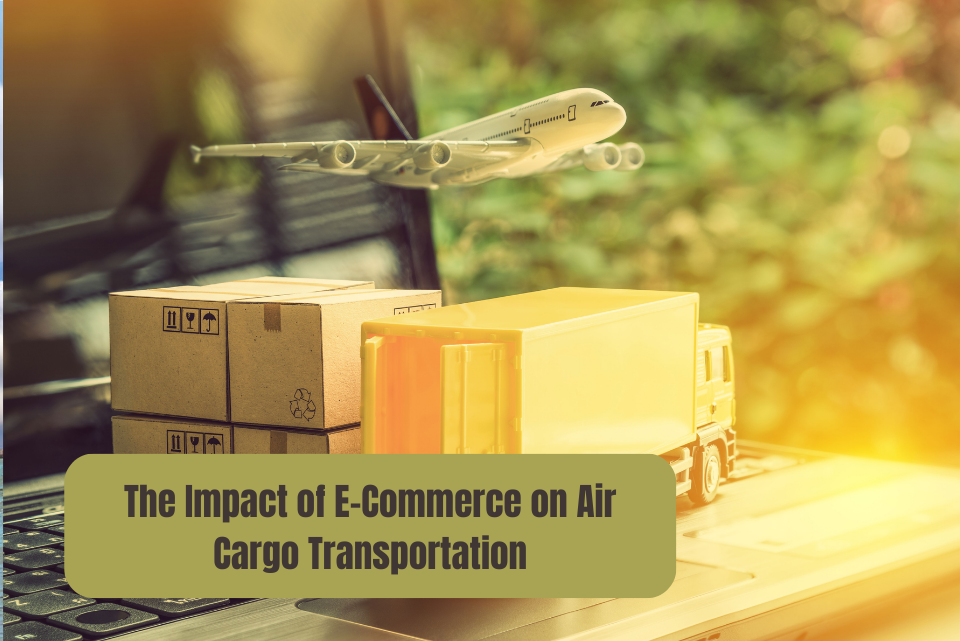In recent years, The speedy development of e-commerce has completely changed the way we shop. With a few clicks, customers can order products from any location in the globe and have them delivered straight to their homes. This surge in online shopping has had a profound impact on various industries, including air cargo transportation. We are going to explore the challenges and opportunities brought about by the growth of e-commerce and how it is affecting the air freight business in this blog post. Additionally, we will delve into the technological innovations and sustainability concerns that are shaping the future of air cargo transportation
The Growth of E-Commerce and Its Influence on Air Cargo Transportation:
The exponential growth of e-commerce has fueled a significant increase in the demand for air cargo transportation. As consumers increasingly shop online, the need for fast and reliable delivery services has become crucial. Traditional shipping methods are often too slow for modern consumer expectations, leading to a surge in air freight. To meet this rising demand, airlines and logistics companies are investing heavily in expanding their air cargo capabilities. This growth has had a profound impact on the air freight industry, with companies adding more cargo planes, improving infrastructure, and implementing advanced logistics technologies. The air cargo transportation industry plays a vital role in meeting the evolving needs of e-commerce and ensuring efficient delivery of goods to customers.
Challenges Faced by the Air Freight Industry:
The growth of e-commerce has presented the air freight industry with various challenges. Two key challenges include:
Capacity Management: The rapid expansion of e-commerce puts pressure on airlines to effectively manage their cargo capacity. Fluctuating demand requires efficient planning and coordination to optimize cargo space and ensure timely delivery. Airlines need to balance available capacity with the increasing volume of e-commerce shipments. Failure to manage capacity effectively can lead to congestion, delays, and inefficient use of resources.
Last-Mile Delivery Complexity: E-commerce often involves delivering packages directly to individual consumers, which adds complexity to the logistics process. The last mile, the final leg of delivery from the distribution center to the customer’s doorstep, presents challenges. Airports and airlines must navigate factors such as traffic congestion, urban infrastructure, and varying customer delivery preferences. To address these challenges, collaborations with local delivery services are necessary. Additionally, the industry is exploring innovative solutions like drones and autonomous vehicles to enhance last-mile delivery capabilities and improve efficiency.
These challenges necessitate continuous adaptation and innovation within the air freight industry to meet the evolving demands of e-commerce. Capacity management and optimizing last-mile delivery are crucial aspects for ensuring efficient and reliable air cargo transportation services.
Technological Innovations Revolutionizing Air Cargo Transportation:
To adapt to the changing landscape, the air freight industry is embracing technological innovations. One significant development is the adoption of digital platforms and automation. These technologies streamline processes, improve efficiency, and provide real-time tracking and visibility of shipments. This allows logistics companies to offer better customer experiences and optimize their operations.
Another innovation is the use of advanced analytics and predictive modeling. These tools enable airlines to forecast demand accurately, optimize routing, and reduce operational costs. Additionally, artificial intelligence and machine learning are being employed to automate various aspects of air cargo transportation, including inventory management and cargo handling.
Sustainability Concerns and Environmental Initiatives:
As e-commerce grows, so does the carbon footprint of the air cargo industry. The environmental impact of increased air freight has raised concerns about sustainability. To address these concerns, airlines and logistics companies are actively working towards reducing emissions and adopting greener practices. This includes investing in fuel-efficient aircraft, exploring alternative fuels, and implementing carbon offset programs. Furthermore, collaborations and partnerships are being forged to develop sustainable supply chain solutions that minimize the environmental impact of e-commerce logistics.
Conclusion:
The rise of e-commerce has brought about significant changes in the air cargo transportation sector. The demand for fast and reliable delivery of online purchases has led to increased air freight volumes, challenging the industry to adapt and innovate. Technological advancements are revolutionizing the way air cargo is managed, improving efficiency and customer experiences. However, sustainability concerns remain at the forefront, prompting the industry to pursue greener practices and explore environmentally friendly solutions. As e-commerce continues to evolve, the air freight industry must stay agile and embrace these transformations to meet the changing demands of the global marketplace



